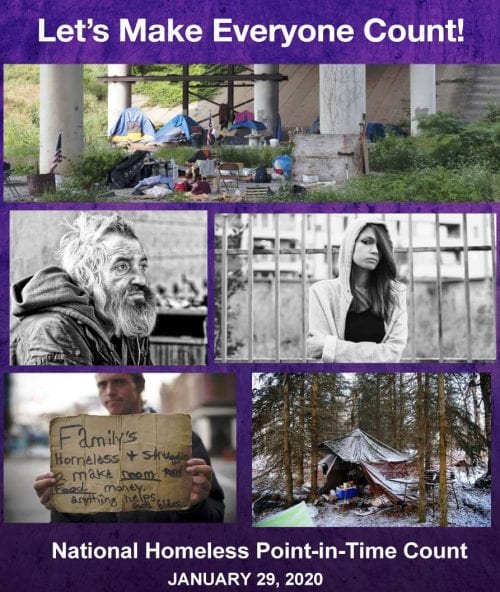
Last Updated on January 29, 2020 6:09 am
Boone, N.C. – Wednesday, January 29, 2020, marks the annual Point-in-Time Count. The Point-in-Time (PIT) Count, coordinated by the Northwest Continuum of Care (CoC), is the annual documentation of the extent of homelessness in the High Country region, which includes Alleghany, Ashe, Avery, Mitchell, Watauga, Wilkes, and Yancey counties.
The information from the PIT Count provides a valuable snapshot of the state and extent of homelessness in our region and informs support service providers on the priorities to prevent and end homelessness. The Point in Time Count is a requirement of the US Department of Housing and Urban Development, which currently supports the Northwest CoC member agencies with $340,169 in competitive grant funding.
The 2019 PIT Count documented 417 people experiencing homelessness, 36 percent of those being children and adolescents and 61 percent of the total unsheltered individuals.
“Since 2016, by expanding “housing first” programs we’ve increased the number of beds by 30 percent while decreasing unsheltered homelessness by 19.8 percent,” states Hospitality House of Northwest North Carolina executive director Tina B. Krause.
Krause continues, “However, there is still much work to be done. As identified by HUD’s most recent Annual Homeless Assessment Report to Congress, the Northwest North Carolina Continuum of Care has the third highest percentage of unsheltered families experiencing homelessness in rural America.”
The Northwest CoC asks churches, local government law enforcement agencies and service providers — food pantries, shelters, community kitchens, schools, utilities, and hospitals — with knowledge of individuals and families experiencing homelessness to contact Local System Administrator Shane Johnson via email grants@hosphouse.org or call Hospitality House (828) 264-1237 ext. 5, the lead agency of the Northwest CoC.
If you are experiencing homelessness, please come forward to be counted. Let a food pantry, school, community kitchen or church know where you are. The count respects confidentiality of those experiencing homelessness and does not obligate anyone for unwanted services. Knowing the extent of homelessness, particularly homeless families and veterans, assists the development of support services to meet the basic needs of housing to those in need.

















